
BLUES JUNCTION Productions
7343 El Camino Real
Suite 327
Atascadero, CA 93422-4697
info
- Home
- Letter From the Editor
- Tom Hyslop: A Personal Appreciation
- Top Ten Albums of 2022
- Dave's Top Ten List of Top Ten Lists
- An Appreciation of James Harman
- Album of the Year: The Duke Robillard Band They Called It Rhythm & Blues
- Album Review: Rick Holmstrom Get It!
- Album Review: The Phantom Blues Band - Blues for Breakfast
- Album Review: Bob Stroger & the Headcutters That’s My Name
- Album Review: Hash Brown - Stop! Your Evil Ways
- Archives
- Contact Us
- Links
Are CDs & Vinyl Records Obsolete?
How many folks remember the dawn of the digital age as it relates to music? I’m not talking about downloads and MP3s just yet. I’m talking about the day I read in the paper that my vinyl record collection would soon become obsolete.
So our record and cassette players would go into storage, you know in the part of our garage called, “The Museum of Obsolete Junk.” Look over there, it’s Grandpa’s Victrola. Near there you find your uncle’s old eight track player, a cassette player as well as a record player because this new fangled compact disc can be played both in your home and in your car. Say goodbye to Dolby, we hardly knew thee. Say hello to the Sony, Walk (don’t run) Man...but don’t get too attached.
Our vinyl and cassettes would soon be replaced by something called, the Compact Disc or “CD” for short. I read that someday I wouldn’t even have to wash the newsprint off of my hands, because I could read the morning paper on a personal computer or “PC” for short.
It was 1982 and Time Magazine had just named “The Computer” their “Man of the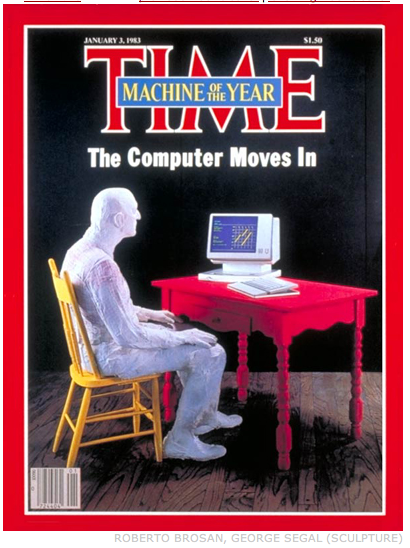 Year.” Great, I’m a 25 year old stud who has just been emasculated by something I’m sure I can’t afford and, even worse, will never be able to figure out how to operate. Maybe I’ll turn to my obsolete record collection for solace while I try and figure out how to swat a fly or line a birdcage with the worldwide web.
Year.” Great, I’m a 25 year old stud who has just been emasculated by something I’m sure I can’t afford and, even worse, will never be able to figure out how to operate. Maybe I’ll turn to my obsolete record collection for solace while I try and figure out how to swat a fly or line a birdcage with the worldwide web.
As I continued to read this article about the advantages of the compact disc, I realized that perhaps the future might not be so bad. The article went on to explain about all of the advantages of the CD that we now take for granted. The writer painted a futuristic tale where you could skip over the Yoko Ono songs on a John Lennon album without having to pick up the needle and set it back down right before the start of the next tune. Oh great, another skill that I had mastered is now relegated to the trash heap of history.
I’m not completely predisposed to playing the role of traditionalist curmudgeon, so I could see that this future had its advantages. The article discussed that the sound fidelity wouldn’t degrade with usage the way it did with vinyl recordings. I guess the big headline was that even an old CD would not sound like the musicians in the recording studio were standing behind a stove while someone was frying bacon. There wouldn’t be any more pops, hisses, skips or instances where the needle would get stuck, get stuck, get stuck. The overall sound quality, convenience, flexibility, transportability, durability was the wave of the future and in a nutshell, I signed on along with virtually everyone else.
Soon Johnny Carson was trying to juggle both a long playing album on vinyl, along with a CD, as he introduced his musical guests. The juggling didn’t last too long. The CD format was just too good.
There were those who declared that the vinyl format for listening to music was a thing of the past. There were those who bravely clung to vinyl despite the pressures of a society that virtually demands that everyone sign up for the next technological advancement or be shamed into the notion that one could be “left behind.”
I admit there were times when I thought I could smell the cardboard of a vinyl record
sleeve. I could hear the cellophane crackle in my fist before entering its temporary 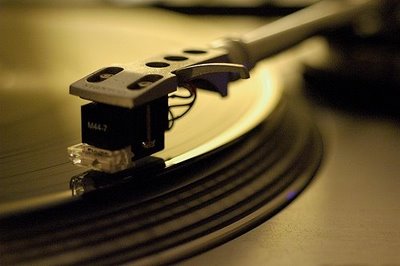 holding facility, the front pocket of my blue jeans. I could envision placing the platter on the turntable with such delicate reverence that it took the form of a religious ceremony. In fact it was just that. Then there was that little wait while the needle found its way past the spaced grooves at the beginning of the record before the highly anticipated first sounds came out of the hi-fi.
holding facility, the front pocket of my blue jeans. I could envision placing the platter on the turntable with such delicate reverence that it took the form of a religious ceremony. In fact it was just that. Then there was that little wait while the needle found its way past the spaced grooves at the beginning of the record before the highly anticipated first sounds came out of the hi-fi.
The entire ritual was part of an exercise that for many, including myself, doesn’t exist anymore. It was an engaging, immersive experience that has been sacrificed in the name of convenience. To be perfectly honest, most of us took that experience for granted anyway and now only look back on it the same way we think about dialing a rotary phone.
Now it has been suggested that CDs are obsolete. The MP3 is the current commodity of choice. We now live in a world that is getting down to down loads on the down low.
Whether or not some of the convenience of the enduring commodity that is the CD outweighs anyone’s affection for vinyl isn’t the point. I am not a format snob, well not yet anyway. It is the fact that they both have many of the same tangible charactiristics, starting with they are both tangible. They actually exist. It is a physical piece of property that one has actually purchased and is owned by that individual. It is separate and distinct from the ether.
What shouldn’t be lost in any of this is that both vinyl and CDs have superior sound quality to MP3s. This is an immutable fact and not subjective conjecture. The highs and lows of the recordings have been shaved off, so that the digital information can fit into the compressed format. There simply is not enough room for all the audio information.
Studies have shown that music consumers are less engaged while listening to MP3s. There is statistical data that has been gathered that the average MP3 listeners are less likely to listen to an entire song, let alone album, without turning their attention to another electronic diversion. This is not all together surprising, as the average human’s attention span is now only slightly greater than that of a hummingbird on crack. This is in part due to the fact that the recording to which we have chosen to listen doesn’t have the texture or dynamics that the artist originally intended. It is a product whose sound has been severely compromised for the sake of the format in which the music is being delivered.
This is in no way analogous to the CD versus vinyl question, where you would have to listen to the same recording in both formats with some pretty sophisticated audio equipment, while sitting in a chair at a certain distance from the speakers, in a room comprised of very specific baffling materials, while having your balls squeezed with just the right amount of pressure by German scientists to tell the difference between the two formats.
I’m sure much of this will be covered in a new documentary about the history of Tower Records. I haven’t screened the film yet, but, like many of us, I am somewhat familiar with the arc of this retail giant. It is the story of humanity vs. technology. Tower Records made a fortune selling CDs and then ultimately was destroyed by the digital revolution that it helped to make commercially viable in the first place.
I’m fairly sure the moment that Dr. Frankestien’s monster breaks free of his chains or when Dave Grohl utters the word, “Rosebud” (whichever comes first) is when Napster is introduced into the film’s narrative. Before anyone can say, “Whitney Houston, we have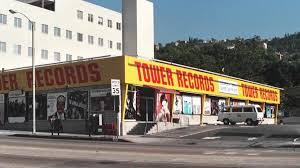 a problem” it is over and Tower Records files for bankruptcy and liquidation.
a problem” it is over and Tower Records files for bankruptcy and liquidation.
The demise of Tower Records in 2006 was that moment when everyone who cares about such things felt like they were staring into the abyss. The sustainability of a brick and mortar retail infrastructure selling primarily CDs was and still is obviously shaky at best. I always liked the idea of the record store as being the town square for everyone but the town’s squares. However, that quaint little notion is just another victim of technology and the immutable law of unintended consequences.
Welcome streaming services, Pandora, Spotify, Google Music. Now, this is when I became a format snob.
If every piece of music of which one can conceive is available to you for less than $10.00 a month, well someone sure as shit isn’t being paid and we know who that is. It is of course the musician who made the music in the first place. For decades it was perceived that the con artists were the record companies. It was those nefarious bandits who were not dividing up the pie in an equitable fashion. While that is a separate discussion and one that could go on for days, the fact is now the pie has all but disappeared. It is the consumer who is saying, “I got mine and I don’t feel like paying for it.” It is the average citizen whose capaciousness for greed can’t be overestimated. We have changed the paradigm. We are the nefarious bandits.
In a nutshell, everyone continues to love music, but no one it seems wants to pay for it, which is the point of all of this in the first place. We have created a world in which it is actually easier to steal music than it is to purchase it. I love the euphemism created for this, “file sharing.” Remember you aren’t stealing, you are sharing.
Additionally, if otherwise, very thoughtful, decent, moral people can have their guilt assuaged by paying less than ten dollars a month to a streaming service that gives them virtually every song that has ever been in the public domain, as opposed to buying a CD, than the future of music looks pretty damn bleak.
If these techno joy riders can’t see how they are contributing to the end of the making of new music, than they just haven’t thought it through yet. I suspect they have and just don’t give a damn. What motivation does any musician have to enter a recording studio? It sure as hell isn’t the concept of economic survival. The royalties most musicians receive from these streaming services isn’t enough to purchase a single bullet with which they could load a gun to stick in their mouth after growing tired of living in abject poverty.
Is this really how we want to treat the people who make are lives worth living? Technology has always presented us with these moral conundrums, but few are so clear cut. Just because we can do something doesn’t mean it is the right thing to do. As the great deity of technology himself, Steve Jobs said, “I’m most proud of the things we didn’t do.”
The argument in favor of streaming music is akin to that of the person who eats at a location of a fast food restaurant chain. It’s fast, it’s convenient and it’s cheap. It is a conscious decision to trade these three things for good taste, real nourishment and a healthy future.
You also get the argument that it exposes people to music that they might not hear otherwise. Fair enough, but isn’t the musician the only person who is asked to give away a lifetime worth of study, practice, talent and creative instincts for the sake of exposure. “Hey bro, this brain surgery is on the house. Tell a friend.”
Then there is the place where it is given away for free every day and that is YouTube. A song here and a song there is available with zero context, perspective or relevance as to why one is listening to a piece of music in the first place. It’s online, it’s free and it is the Wild West. There are no rules and of course no royalties being paid. Music is just cheapened and devalued even further.
So CD sales are down and have been for some time. Finally after years of people saying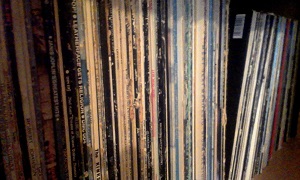 that vinyl is making a comeback, for the first time that statement is actually true. CDs still remain the dominant legitimate medium of choice, yet vinyl’s numbers are actually on the rise over the past three years. This constitutes an honest to God trend and the most interesting part of this is that it is Millennials and not Baby Boomers who are leading the way. Young hipsters are now buying vinyl records and turntables at Urban Outfitters.
that vinyl is making a comeback, for the first time that statement is actually true. CDs still remain the dominant legitimate medium of choice, yet vinyl’s numbers are actually on the rise over the past three years. This constitutes an honest to God trend and the most interesting part of this is that it is Millennials and not Baby Boomers who are leading the way. Young hipsters are now buying vinyl records and turntables at Urban Outfitters.
Again, this isn’t about CDs versus vinyl. It isn’t about any physical format being better than any other. It is about music that has been purchased. It is about a world where the artist figures somewhere in the financial equation. At the end of the day, the CD format gives the consumer and the artist exactly what each is looking for. Thirty three years down the road the CD remains a trusted and durable commodity. It has lived comfortably next to its vinyl relative and hopefully both have a prosperous future.
So, to the original question: Are CDs and vinyl records obsolete?
If you appreciate that music is more than wallpaper and white noise, then CDs are NOT obsolete. If you enjoy taking pride in ownership of music that you purchased, then CDs are NOT obsolete. If you love reading the liner notes and admiring the art work, than CDs are NOT obsolete. If you enjoy listening to music that you can’t find anywhere else, then CDs are NOT obsolete.
Most importantly, if you like the idea that we can have a future where new music is being made that goes beyond the manure that is being shoveled at us by the mass 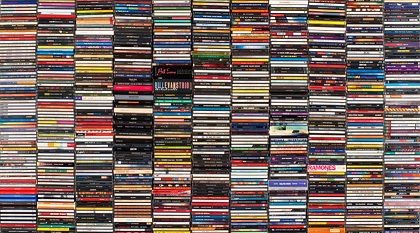 media and sold at massive chain box stores, then CDs are definitely NOT obsolete.
media and sold at massive chain box stores, then CDs are definitely NOT obsolete.
There are those who would say, ‘I don’t have room for my CDs.’ Where do I put them?
I have an answer for that as well. We make room in our lives for the people, places and things that are important to us. Put them in the room of your domicile where you spend the most time. Put them where others can see them and they are accessible. Make a shrine out of them. They are you. They reflect your heart and soul. Keep them close to your heart and don’t put your soul in storage.
At least that’s what I think. As always I would love to hear from our thoughtful and articulate readers on this topic.
- David Mac
Help us continue to provide meaningful articles and reviews of blues & roots music. <-Click here to donate.
Copyright 2022 BLUES JUNCTION Productions. All rights reserved.
BLUES JUNCTION Productions
7343 El Camino Real
Suite 327
Atascadero, CA 93422-4697
info